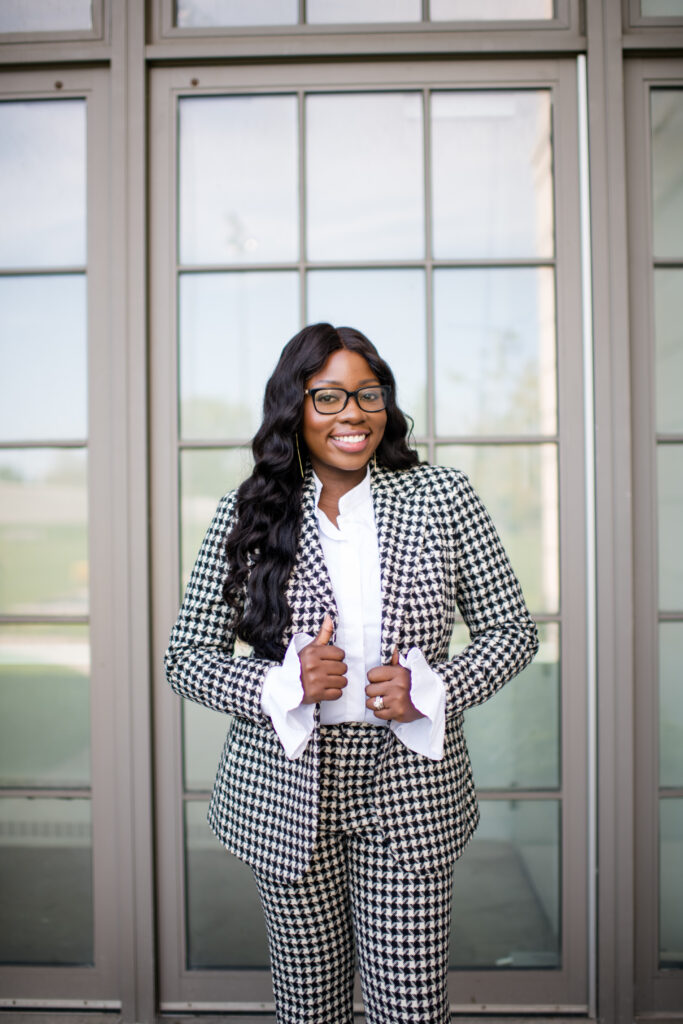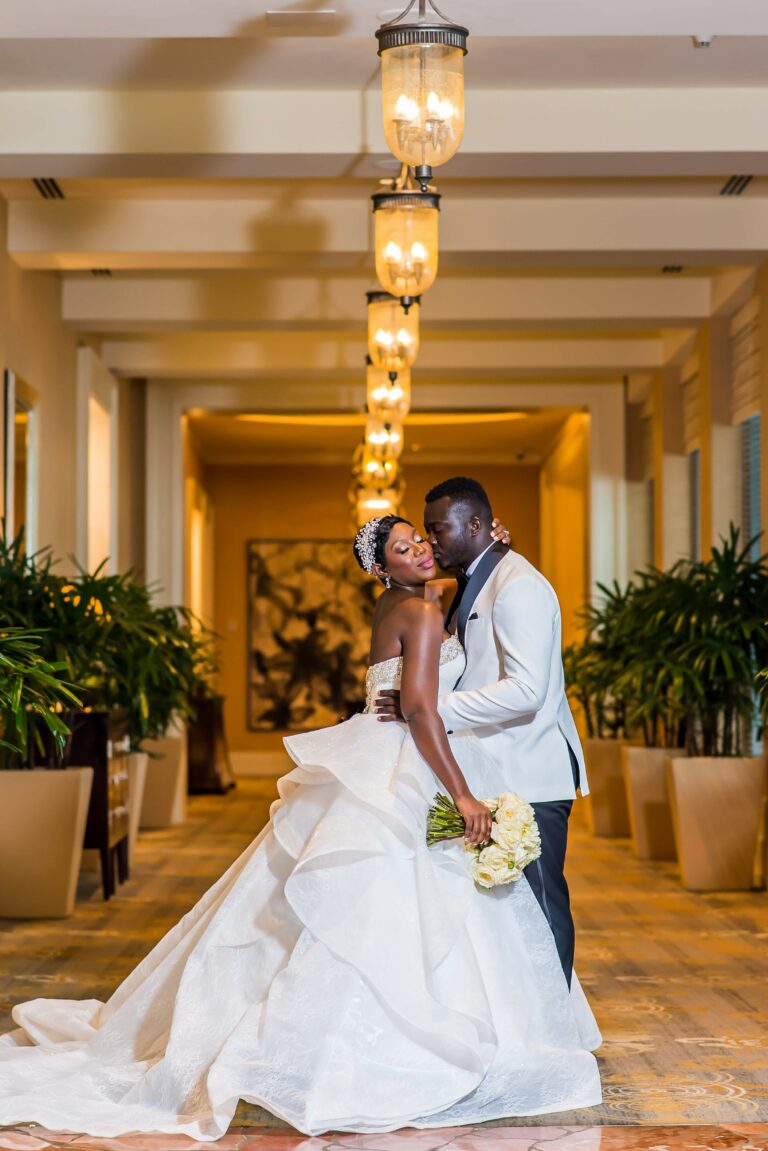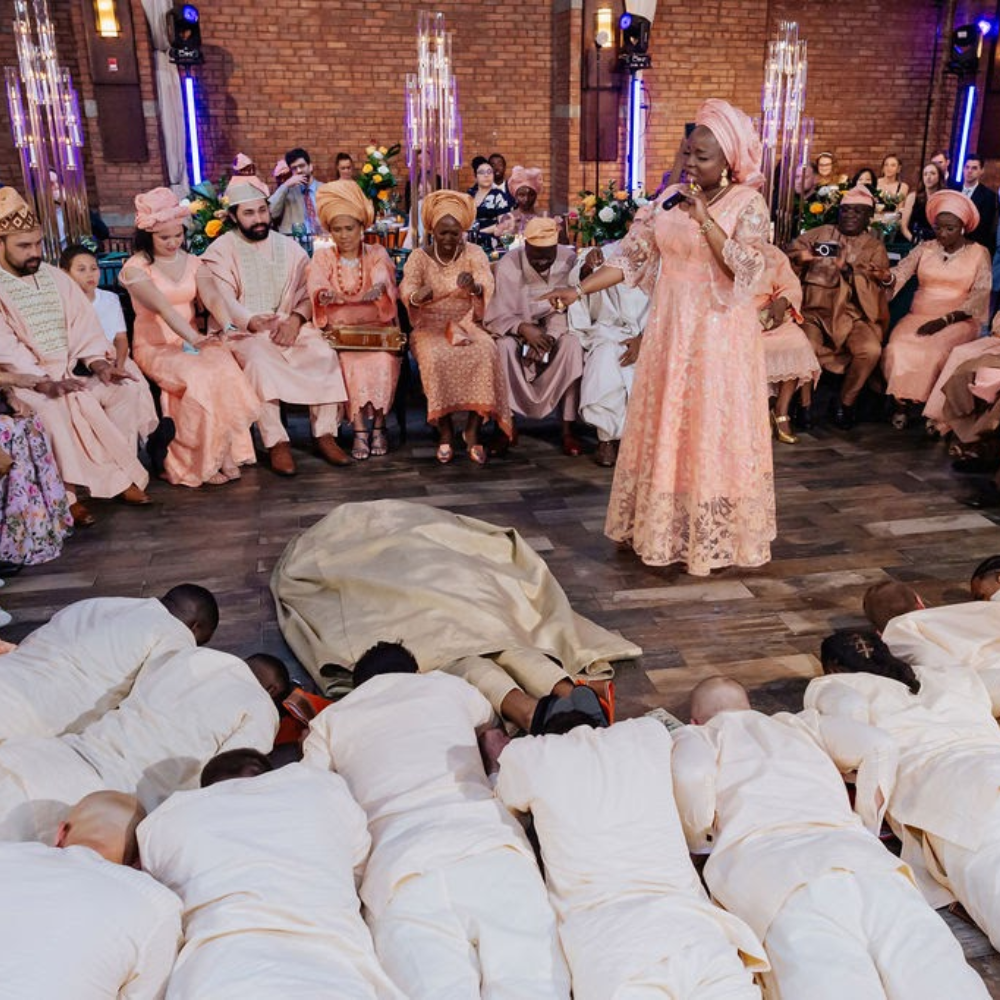
Nigerian Yoruba Engagement Ceremonies (also known as the Traditional Wedding) are a colorful celebration of love, culture, and community. Steeped in rich traditions that have been passed down through generations, these weddings are a sight to behold.
In this ultimate guide to Nigerian wedding traditions, we’ll explore the ceremony, attire, key roles, and key components that make Nigerian Yoruba Engagement Ceremonies truly special.
Whether you’re a bride or groom-to-be, a guest attending an upcoming wedding or simply curious about the customs, we’ve seen it all in our 10 years planning and executing Nigerian weddings in the United States and we’ve got you covered!
Key Rituals and Traditions Before The Yoruba Engagement Ceremony
Nigerian Yoruba weddings are known for their lively and festive atmosphere. But beyond the vibrant celebration lies a carefully orchestrated sequence of events, each one holding deep significance.
Before the grand Engagement Ceremony takes place, there are key rituals and traditions that must happen. These pre-engagement events are a crucial part of the wedding journey, reflecting the deep cultural roots and strong familial ties. In this section, we will explore the significance of the Introduction Ceremony and the Engagement Rites, each step contributing to the unfolding love story of the couple.
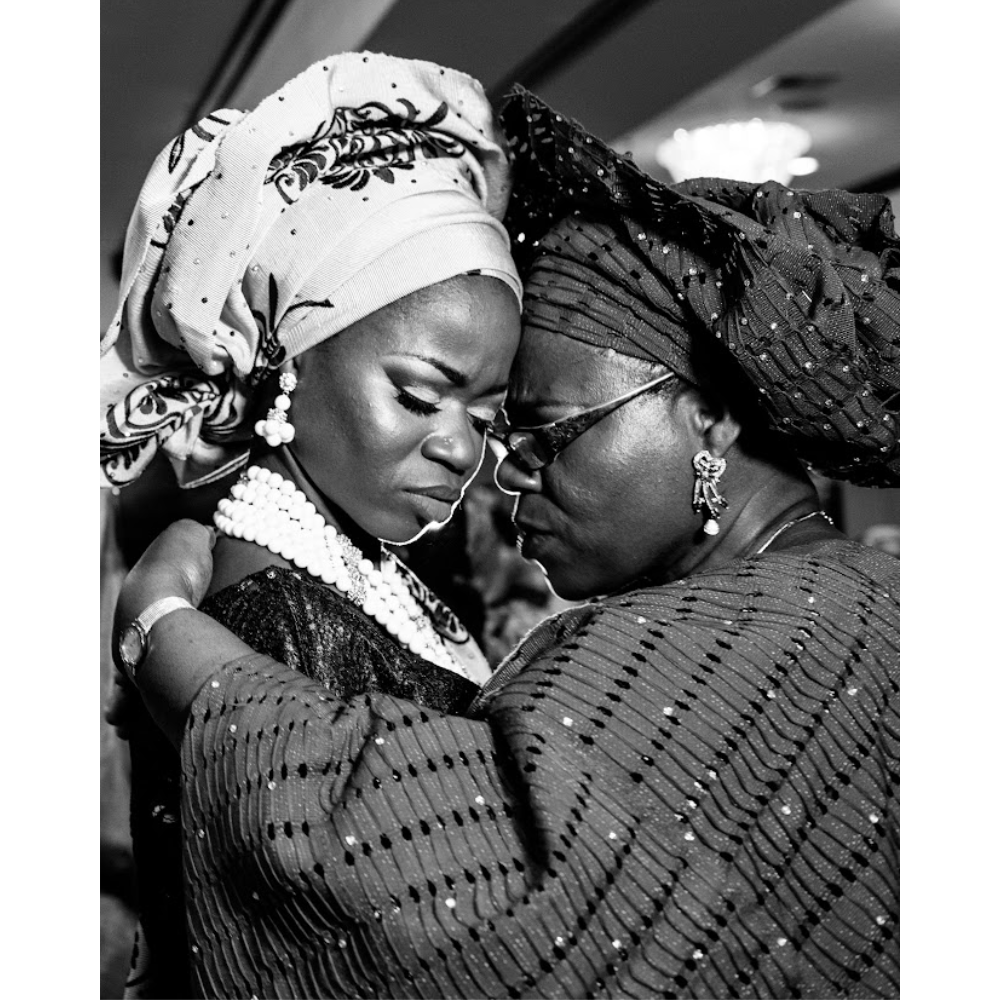
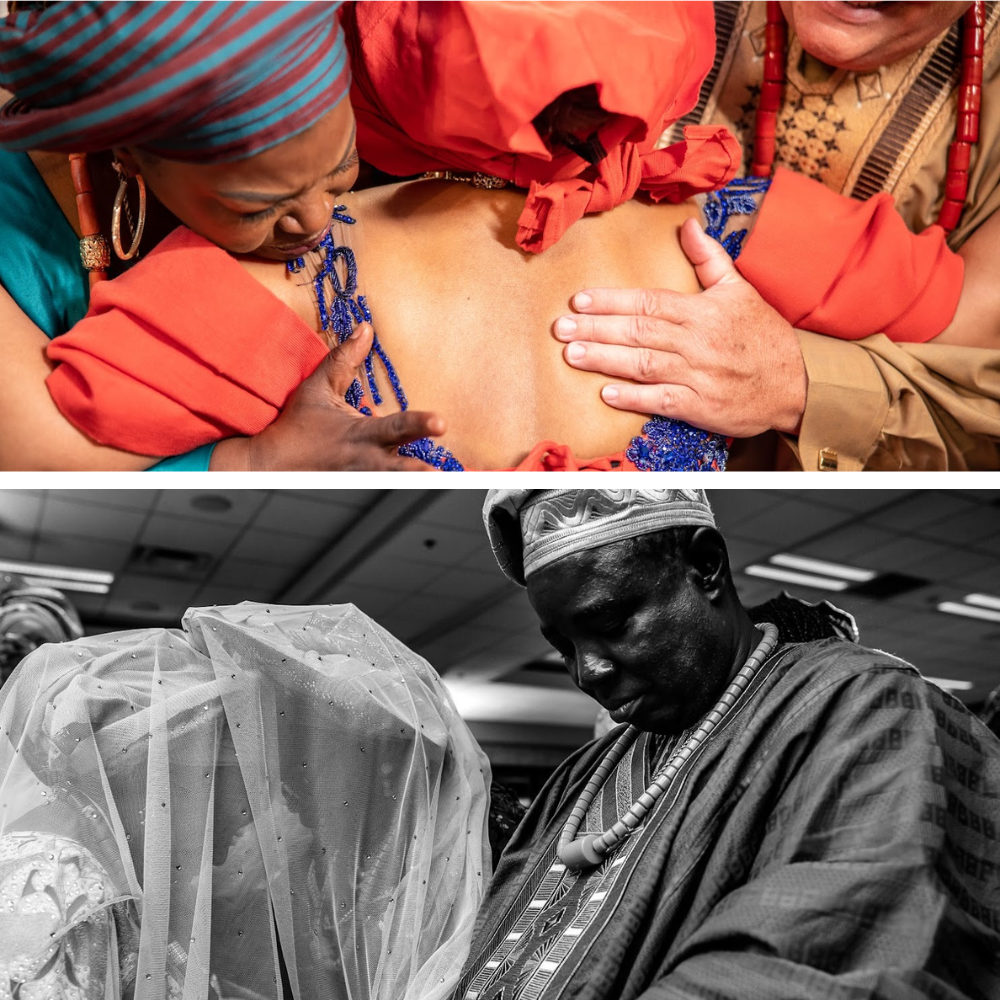
Introduction Ceremony
The Introduction Ceremony marks the initial step in the journey towards matrimony. Often held at the bride’s family home, this event brings both families together for the first time. It is a moment of joy and anticipation as formal introductions and greetings take place.
During this intimate gathering, gifts are exchanged between the families, symbolizing mutual respect and goodwill. The exchange of gifts serves as a gesture of appreciation and a show of commitment to the union. The bride’s family, in particular, may present various symbolic items, showcasing their acceptance and support of the forthcoming marriage.
Engagement Rites
As the wedding preparations progress, the Engagement Rites take center stage. This is a more formal event where the families officially agree to the marriage, and it is filled with rituals and negotiations that symbolize the unity of the couple and their families.
One of the primary rituals in this ceremony is the reading of the Qu’ran or bible which is performed by a respected elder or religious leader, invoking blessings upon the couple and seeking divine guidance for their future together.
Another notable custom during the Engagement Rites is the “Exchange of Dowry.” The groom’s family presents gifts and monetary offerings to the bride’s family as a symbol of appreciation and acknowledgment of all of the hard work, guidance, love and education that the parents and bride’s family invested in her to become the woman the groom wants to marry. This gesture also demonstrates the groom’s commitment to providing for the bride and supporting her throughout their married life.
Furthermore, negotiations take place during this event, often led by designated representatives from each family. These negotiations ensure that both families are in agreement with the terms and conditions of the marriage, including the wedding date, and other important aspects of the union.
Order of Events For a Traditional Yoruba Engagement Ceremony
The Traditional Yoruba Engagement Ceremony is the main event which includes various rituals and blessings moderated by 2 female MC’s called an Alaga iduro (who represents the groom’s family) and Alaga Ijoko (who represents the bride’s family). For multicultural weddings where only one person is Nigerian, 1 Alaga representing both families is normally acceptable.
Below is the typical order of events for a Yoruba Engagement ceremony. Every family has slight nuances in their personal customs and traditions for their family so it’s always important to check in with parents for their approval.
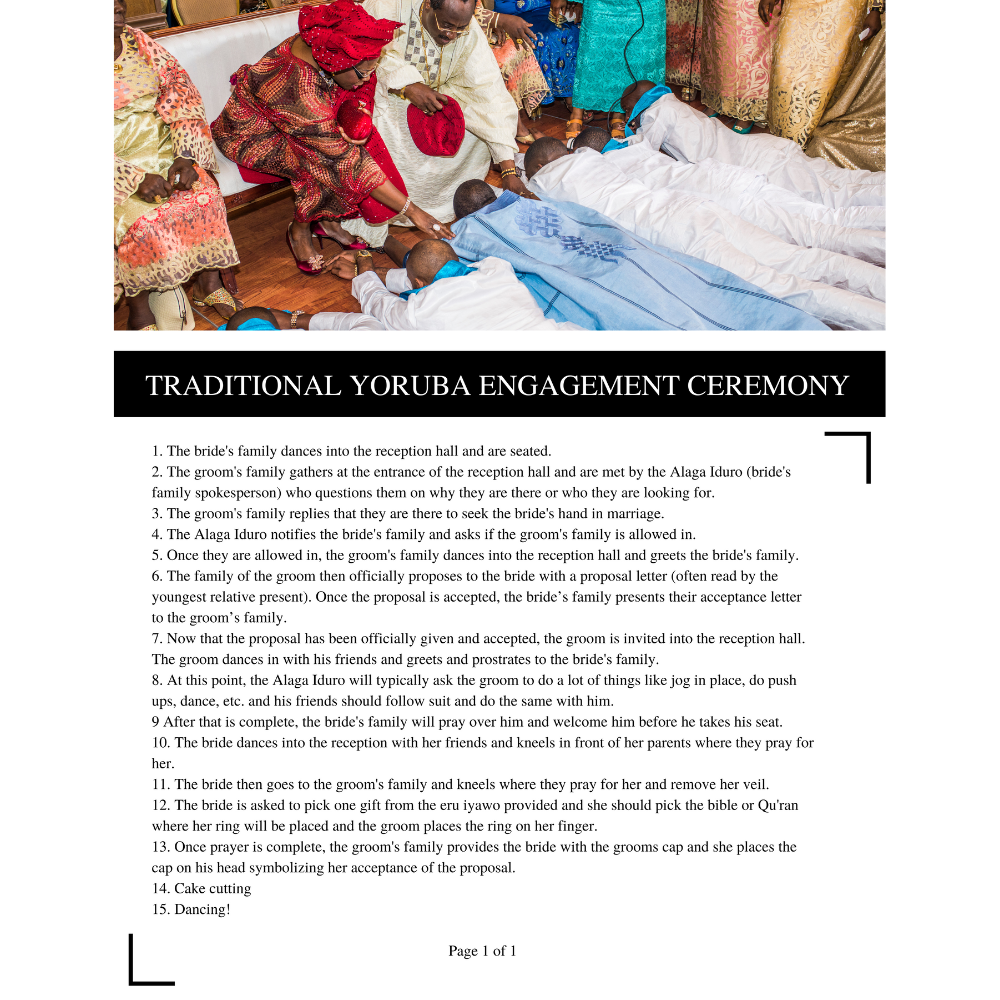
For weddings where both of the celebrants are Nigerian but have different subcultures for example, the bride is Yoruba but the groom is Igbo, the Traditional Wedding aligns with the bride’s culture. For weddings where the bride is of more than one subculture, for example, the bride’s father is Yoruba and the bride’s mother is Hausa, the Traditional Wedding aligns with the bride’s father’s culture.
In terms of how much time is allotted, 2 full hours is usually enough time for a traditional wedding that occurs in the United States. It’s important to reiterate and agree on a time for the ceremony because things can be easily drawn out for much longer if there is not a consensus that timing should be adhered to. On wedding days, there are so many moving parts that are reliant on proper timing which have an adverse effect on the entire day if not managed wisely.
Key Roles in a Traditional Nigerian Engagement Ceremony
A Traditional Nigerian Engagement Ceremony is a harmonious symphony of roles that come together to create a celebration that is as vibrant as it is meaningful. These key roles, each contributing their unique essence, breathe life into the event, transforming it into an unforgettable experience that resonates with cultural richness and joyful camaraderie.
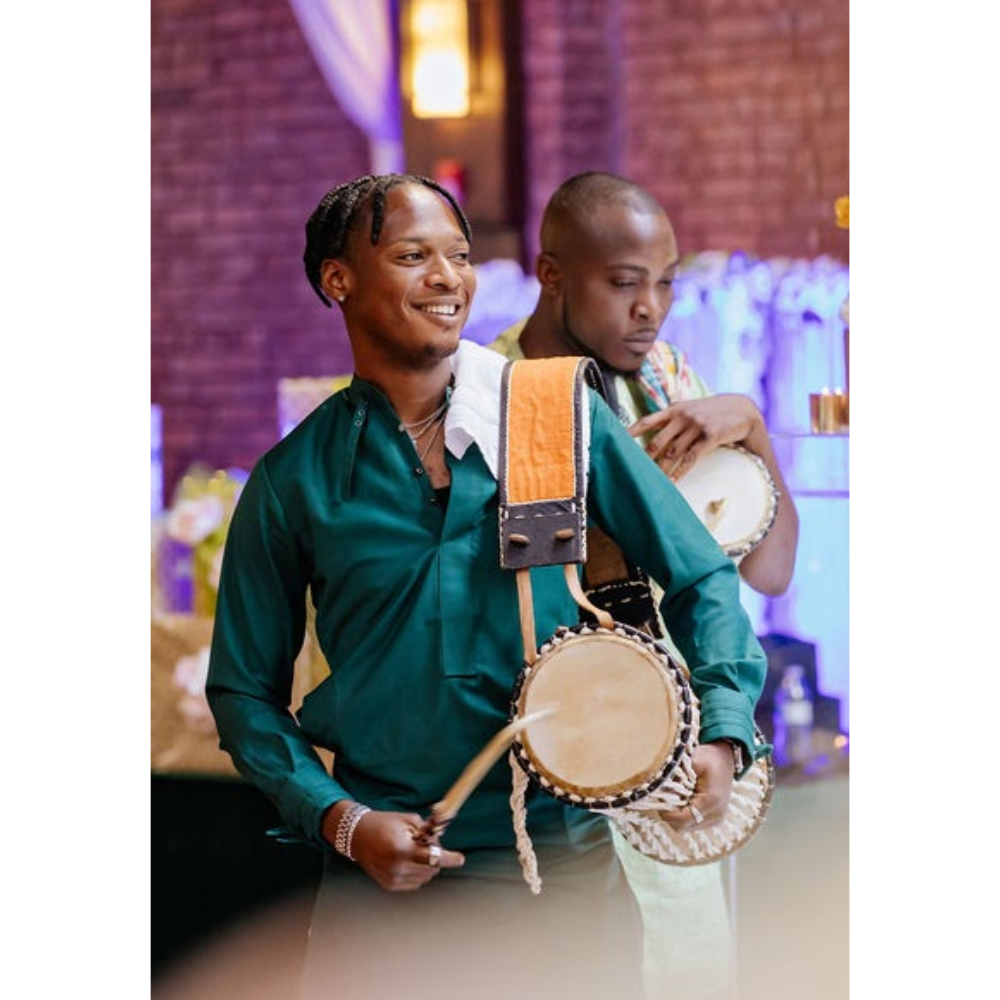
Alaga Iduro
At the heart of the engagement ceremony stands the Alaga Iduro who is always a woman. The Alaga Iduro serves as the official representative of the groom’s family; guiding the proceedings with a deep understanding of the cultural intricacies. She ensure that the event maintains its solemnity and respect for tradition.
Alaga Ijoko
Complementing the Alaga Iduro is the Alaga Ijoko, a role that represents the bride’s family. This role is always a woman. She, along with the Alaga Iduro engages the audience, and ensures that smiles and laughter abound.
Through their engaging performances the Alaga Ijoko and Alaga Iduro infuse the event with an atmosphere of merriment, creating cherished memories that live on long after the celebration.
Talking Drummers
The engagement ceremony also incorporates talking drummers. With drums that seem to converse through beats, they infuse the air with an irresistible energy, heightening the emotions of the moment. These skilled musicians do more than create music; they tell stories through their rhythms, evoking the spirits of ancestors and breathing life into age-old customs. The Talking Drummers connect the present to the past, reminding all in attendance of the enduring heritage they celebrate.
Live Nigerian Band
Elevating the festivities to a crescendo is the Live Nigerian Band, a dynamic force that fills the air with melodies that enthrall and enchant. The band captures the essence of celebration in every note. The band typically begins playing after the ceremony and dinner is complete. If you are not having a DJ, the band can play for the entire night. If you are also having a DJ, the band plays for two to three hours and then the DJ takes over for the younger crowd.
The Key Differences in a Traditional Nigerian Engagement Ceremony and a Western Wedding
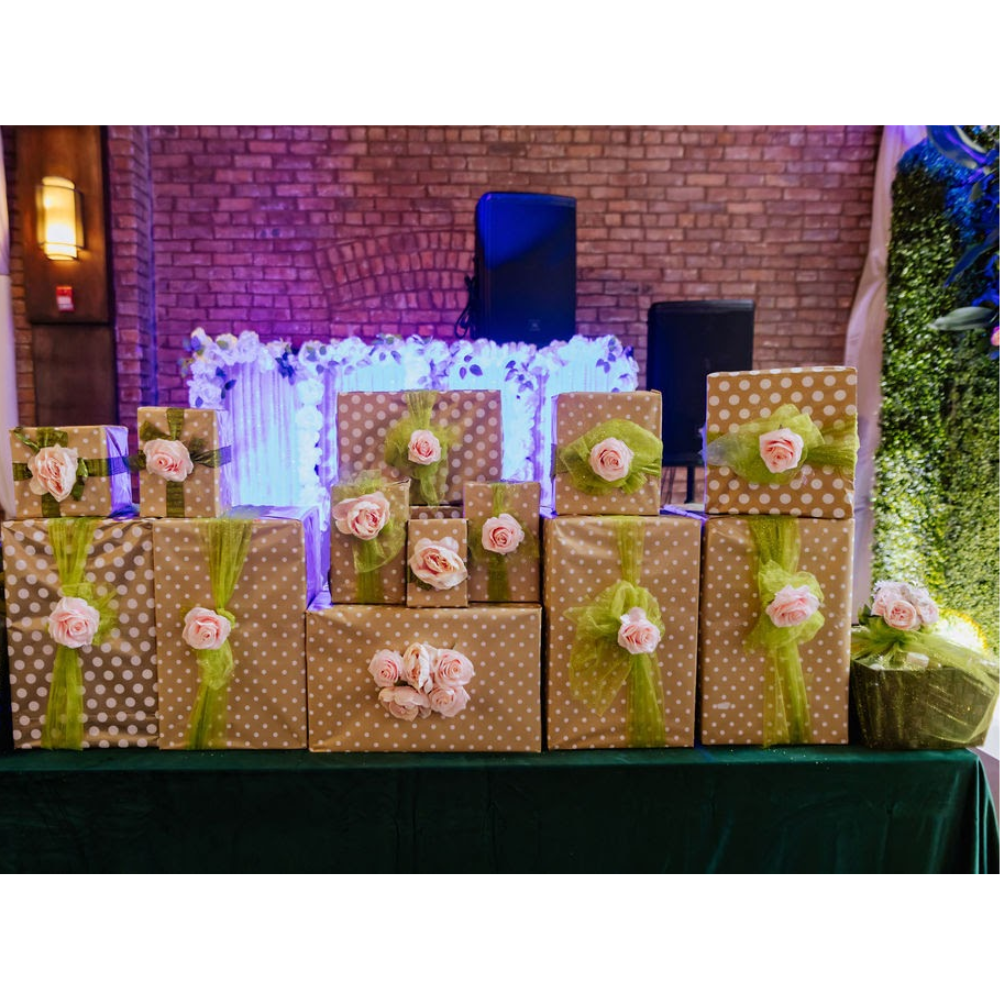
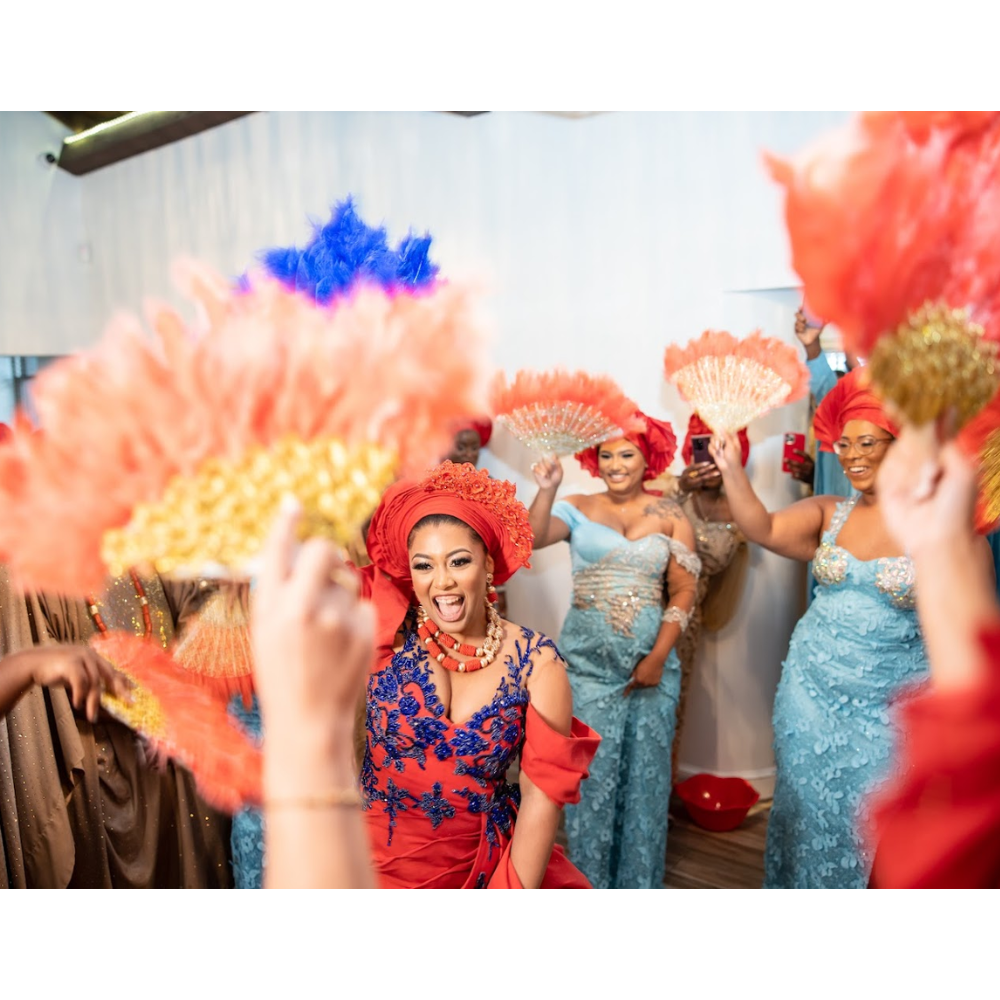
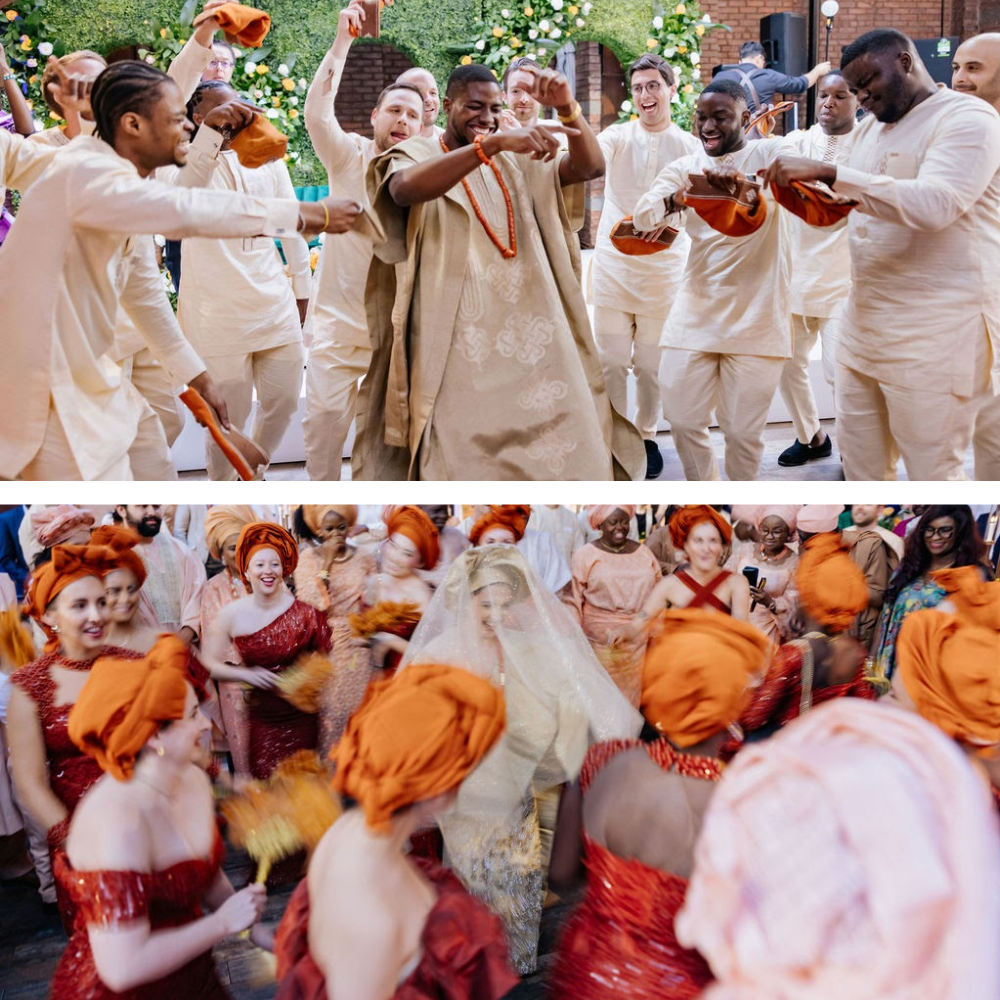
Nigerian Yoruba weddings are distinct from Western weddings in several ways:
- Attire: The bride and groom wear traditional Yoruba attire, which is usually bright and elaborately adorned with beads and embroidery. Guests also often wear complimentary traditional outfits.
- Guest Involvement: Nigerian weddings are known for their inclusivity and community involvement. Guests actively participate in dances and shower the couple with money in a tradition called “spraying.”
- The Groom Prostrating: In a Yoruba wedding, the groom’s prostration is a poignant moment. He shows deep respect to the bride’s family by kneeling and touching his forehead to the ground. It symbolizes humility, respect and honor for the bride and groom’s elders and family and his readiness to be a caring husband.
- Eru Iyawo: The Eru Iyawo is a cherished tradition where the groom’s family presents valuable gifts and items to the bride. It symbolizes his love and commitment to provide for her throughout their life.
- The Dowry: The dowry involves gifts and money provided from the groom’s family to the bride’s family. Items include food (yams, palm wine, fruit, salt and candy) and physical goods like luggage and cookware.
- Bride and Groom Dancing in with Their Friends (Separately): For their entrances, the bride and groom dance with their friends separately into the venue. Many times, the bride and her ladies will have a dance routine to entertain the crown and the groom that awaits.
Guest, Family and Celebrant Attire
As a guest, plan for vibrant and colorful outfits to compliment the Nigerian culture.
Families of the celebrants often wear “aso-ebi” (translated in english to “family clothes”) where the material is chosen by the couple’s families and the recipient of the fabric works with any tailor to create a design of their choosing.
Men typically wear “agbadas” or “buba and sokoto,” (translated in english to “shirt and pants”) which are traditional Nigerian clothing styles. Here are additional details about Nigerian attire and what you can expect to see at a Nigerian wedding.
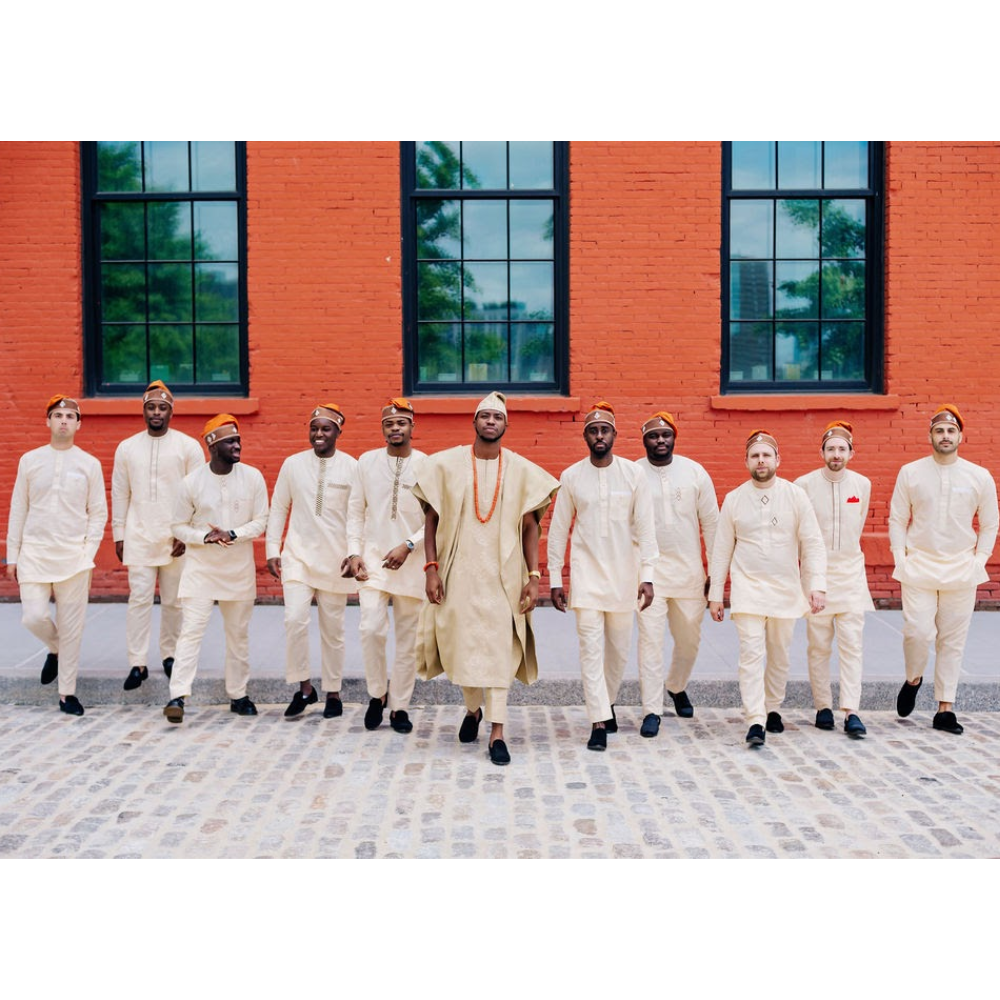
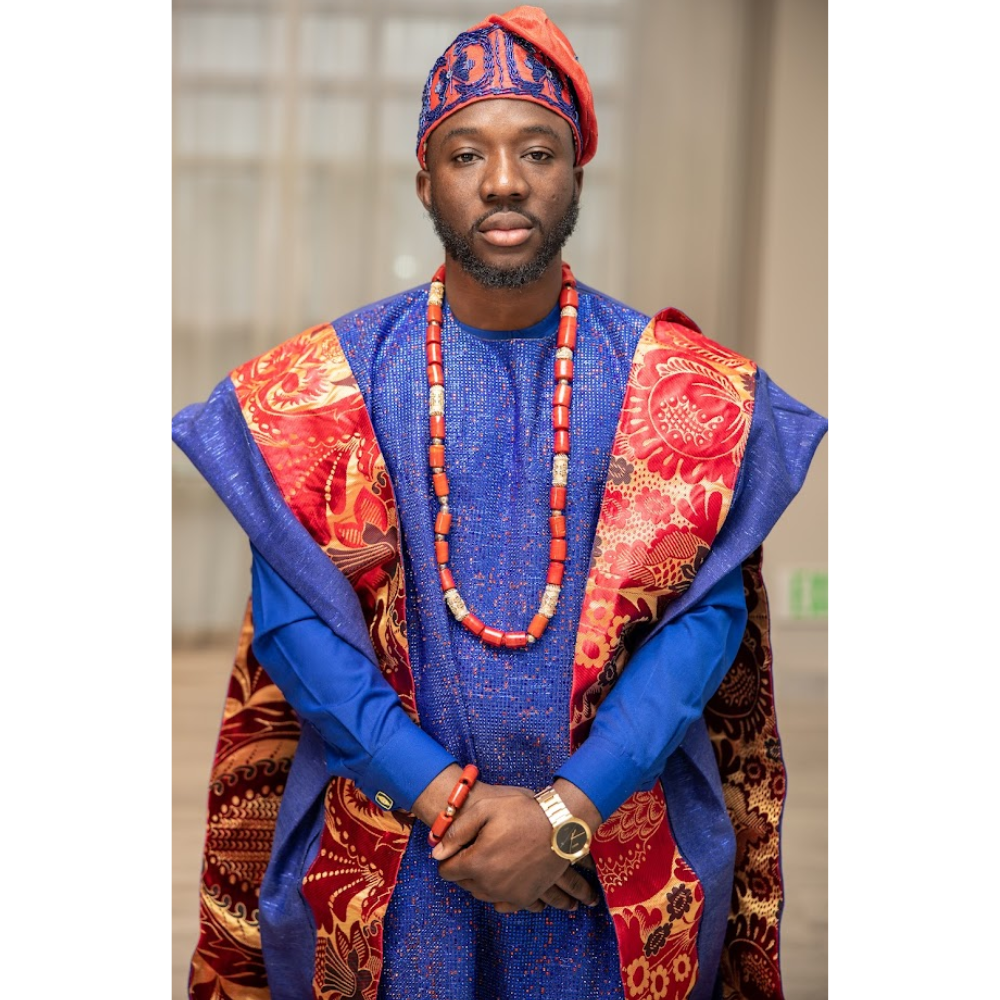
- Aso Oke: Aso Oke is a prominent fabric in Nigerian Yoruba weddings, used to create various elements of the bride and groom’s attire. It is a handwoven textile that comes in rich and vibrant colors, often with intricate patterns and designs. For the groom, Aso Oke is commonly used to craft his Agbada, cap (Fila), and other accessories. The bride’s Aso Oke is used for her headwrap (Gele), shawl, and sometimes incorporated into her blouse or skirt. The use of Aso Oke adds a touch of elegance and cultural significance to the couple’s attire, making them stand out on the wedding day.
- Agbada: Agbada is a traditional Nigerian outfit worn by men during special occasions like weddings. It consists of three main pieces: a long-sleeved shirt, a matching pair of trousers, and a large, intricately embroidered “robe” worn over the gown. The Agbada is often made from luxurious fabrics like silk, brocade, or damask, and the embroidery work is meticulously crafted to display exquisite patterns and designs. The groom’s Agbada is usually more elaborate, featuring bold colors and intricate details.
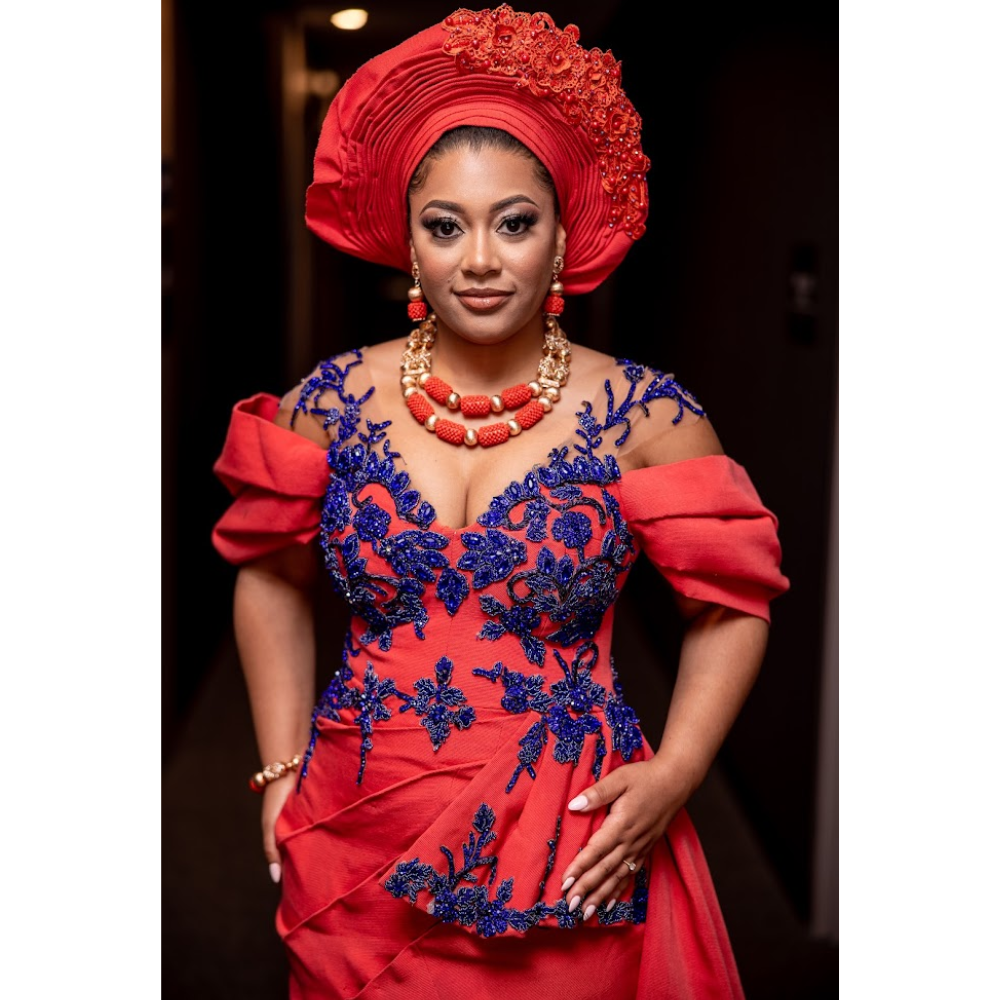
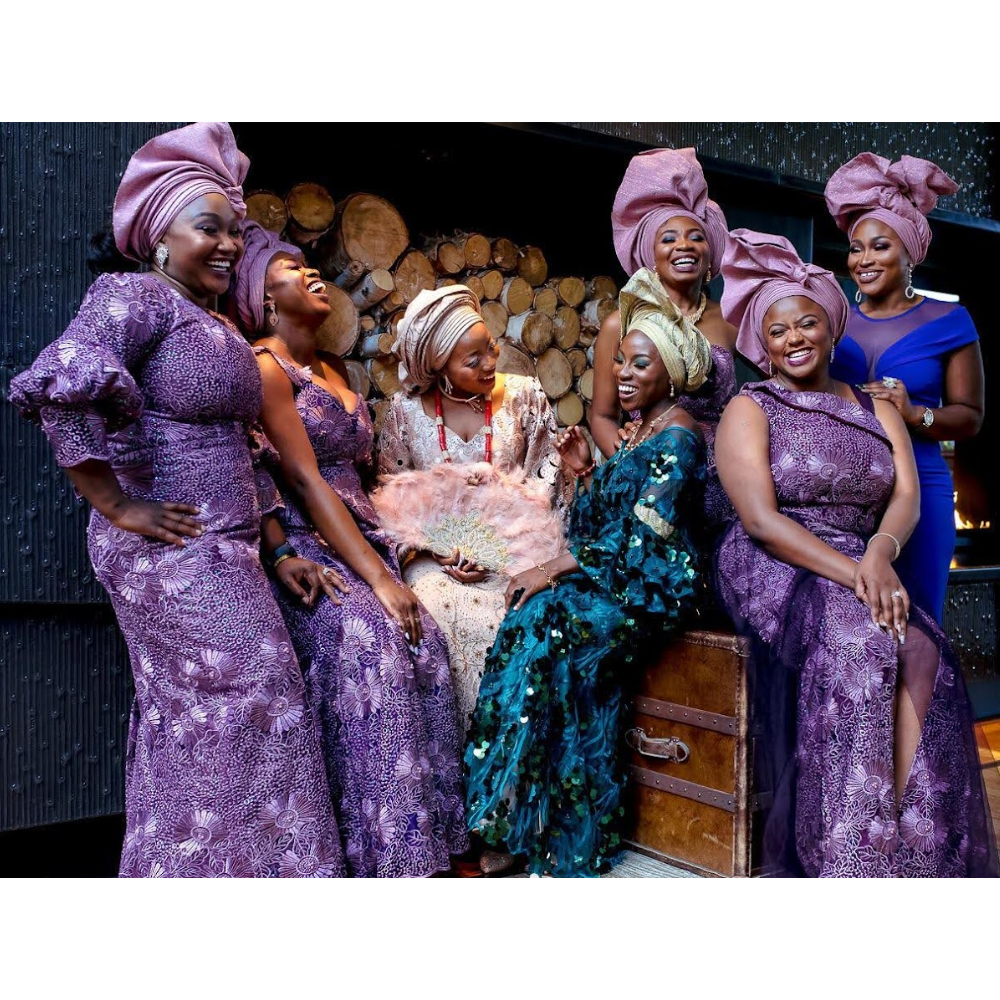
- Gele: Gele is a head wrap worn by both the bride and other female guests. It is an artful display of fabric manipulation, skillfully wrapped around the head to form an elegant and elaborate headpiece. Geles are available in various colors, patterns, and fabrics, including Aso Oke. The bride’s Gele is usually one of the most intricate and eye-catching, perfectly complementing her attire and making a bold statement.
- Coral Beads: Coral beads are an integral part of the bride and groom’s jewelry in a Yoruba wedding. These vibrant, deep coral colored beads are believed to bring good luck, protection, and fertility to the bride. The beads are intricately strung together to create beautiful necklaces, bracelets, earrings, head pieces, etc. Yoruba brides typically wear a gele but can also wear coral beads in their hair for their second outfit change if desired. The groom wears coral beads around his neck and wrists.
Typical Cuisine Offerings
Nigerian weddings are renowned for their great food.
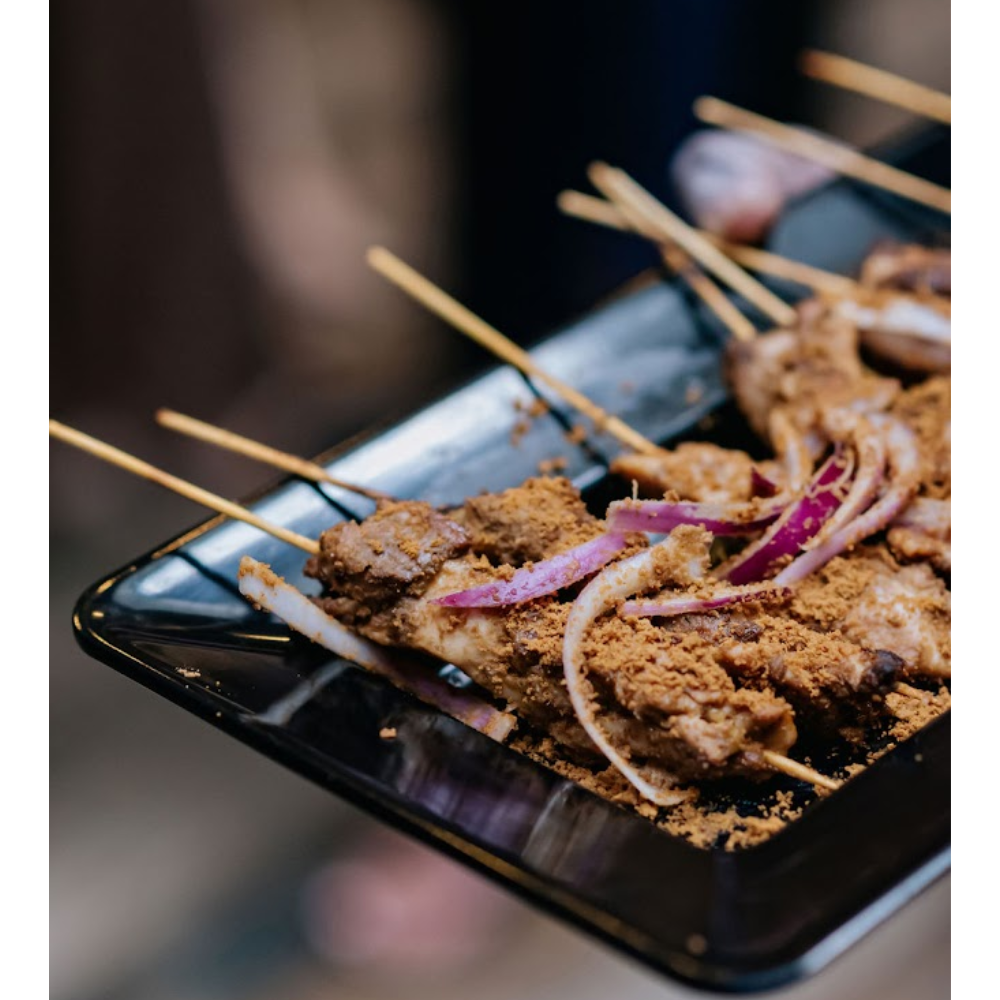
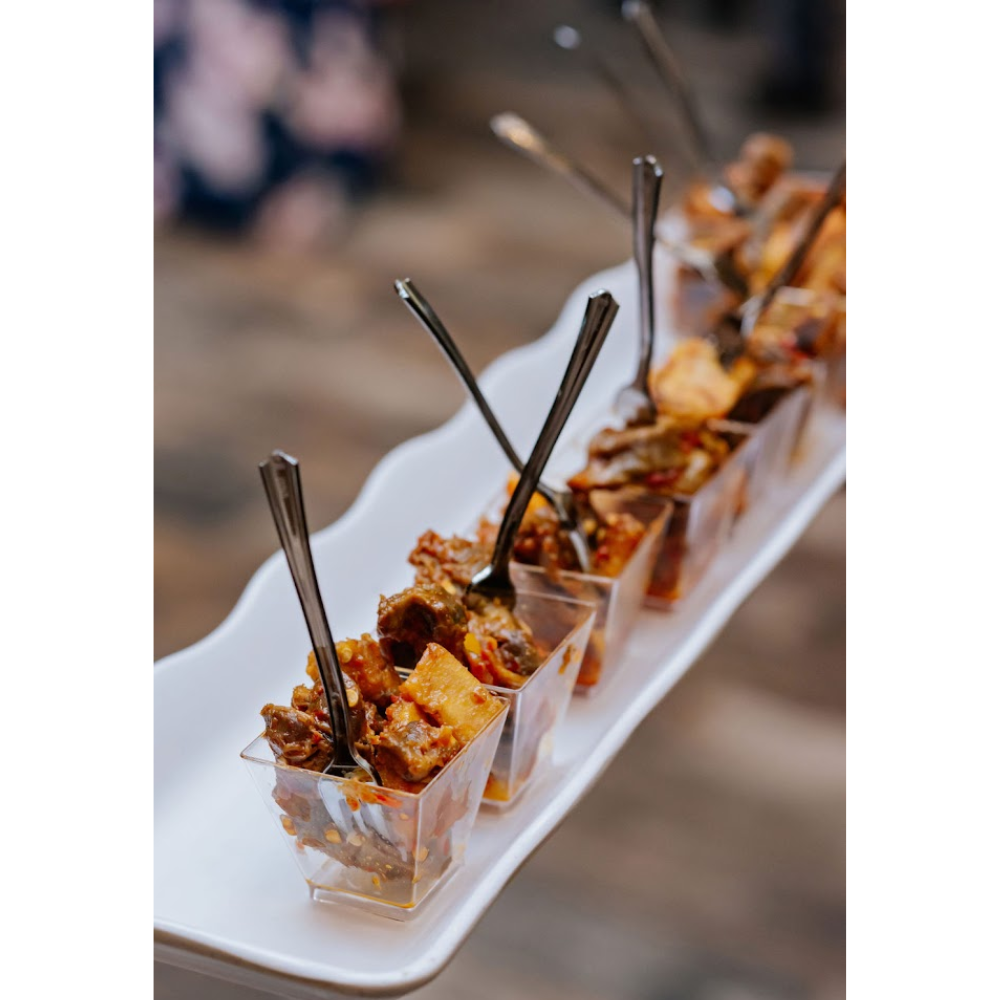
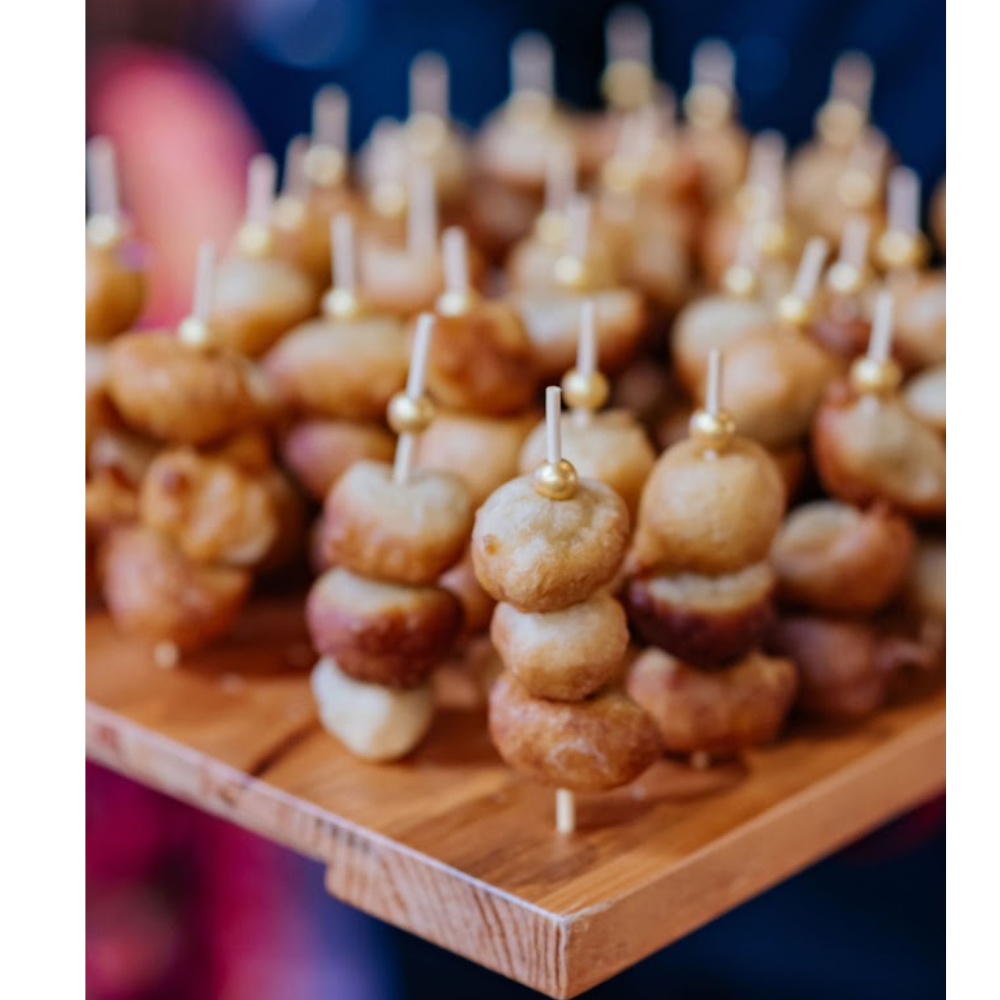
For small chops, you will normally see the following
- Beef or chicken suya
- Meat pie
- Puff puff
- Fish roll
- Scotch egg
- Asun
- Gizdodo
Small chops are served before and during the traditional wedding. You can also bring out the small chops towards the end of the reception as a late night snack for guests.
For dinner, many couples decide to have a buffet dinner to give guests more options and the ability for seconds. Here is a list of food you will likely see.
- Jollof rice
- Fried rice
- Stewed fish, chicken, turkey and/or goat meat
- Dodo (sweet plantain)
- Moi moi
- Salad (Nigerian salad or cesar salad)
- Pounded yam with efo riro and egusi
- Asaro (yam porridge)
For more formal weddings, some of our couples choose to have a plated meal. In this case, 2-3 meal options are provided to guests to select as part of their RSVP. For plated meals, we recommend no more than 5 items on a plate. Here are a couple of curated plated Nigerian options:
- Jollof rice, fried rice, goat meat, moi moi and plantain
- Jollof rice, stewed fish, stewed goat meat, moi moi and plantain
- Pounded yam, efo riro, stewed fish and stewed goat meat
What Gift Should I Bring to a Nigerian Yoruba Wedding?
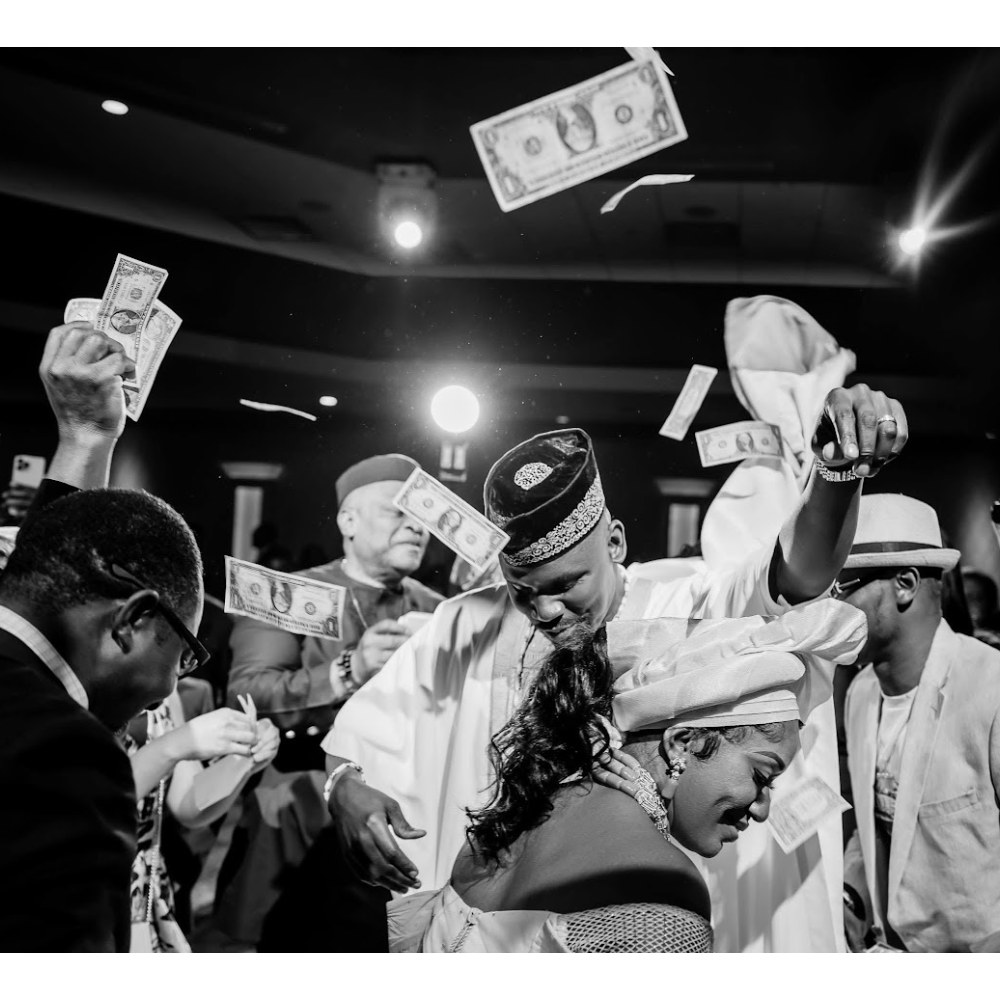
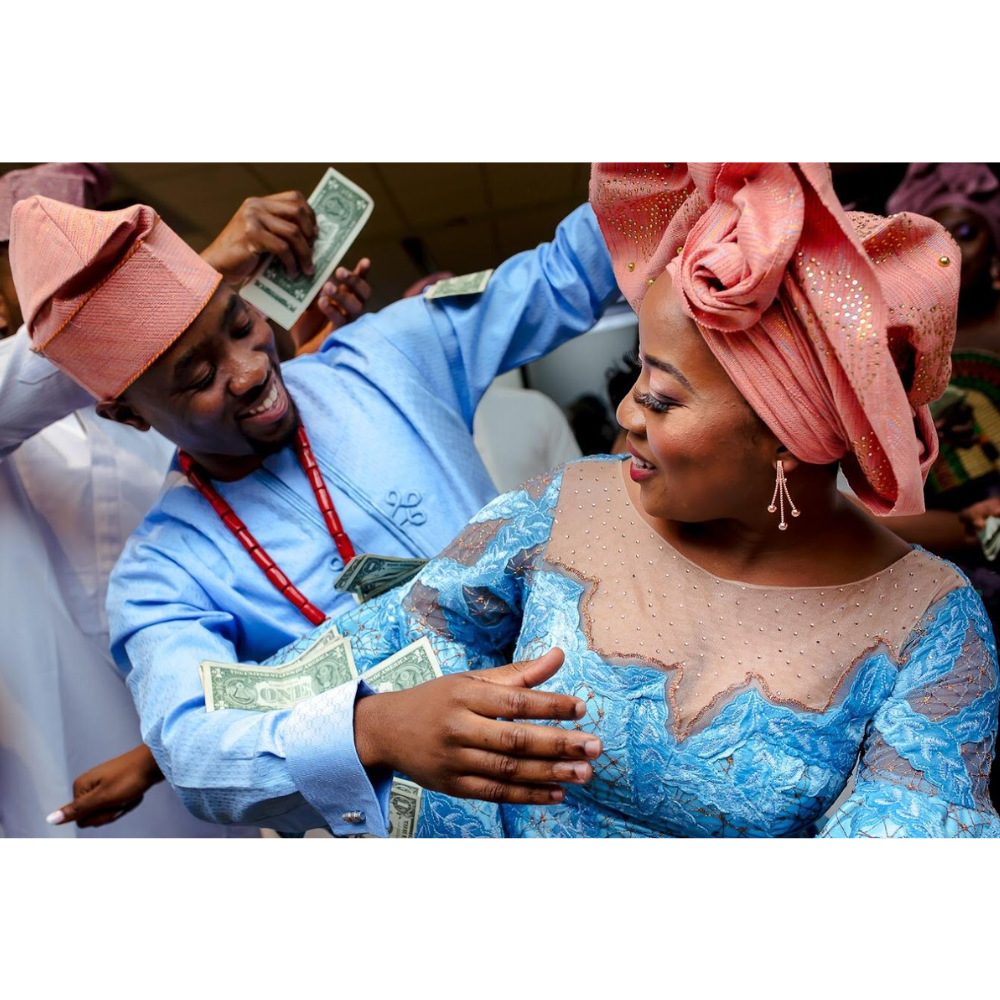
While there is no strict gift-giving tradition, it is customary to give monetary gifts to the couple by “spraying” them. The spraying tradition involves guests showering the couple with money during dances and celebrations. The amount is entirely at the guest’s discretion, and the gifts are seen as a gesture of goodwill and support for the newlyweds.
Things You Shouldn’t Do at a Nigerian Yoruba Wedding?
While Nigerian Yoruba weddings are joyful and inclusive affairs, there are a few things guests should keep in mind:
- Respect Cultural Norms: Be aware of and respect the customs and traditions of the wedding. Avoid anything that may be deemed disrespectful or inappropriate.
- While guests are being sprayed, do not pick up money that has already fallen on the floor and “recycle” it by spraying the couple again.
- It’s a cultural norm for Nigerian weddings that do not have a wedding planner to start late. Try not to get frustrated. The experience will definitely be worth the wait.
Nigerian wedding traditions at Yoruba Engagement Ceremonies are a beautiful blend of tradition, love, and community. From the vibrant attire to the delectable cuisine and the rich cultural rituals, these weddings are a testament to the richness of Nigerian heritage. Whether you’re attending as a guest or simply curious about this fascinating culture, embracing the customs and celebrating with the couple will undoubtedly create cherished memories that last a lifetime.
If you’re planning your Nigerian wedding and want to know some of our secrets on how to ensure your guests are not late for your wedding, read this article next: How to Avoid Late Guests For Your Nigerian Wedding.
